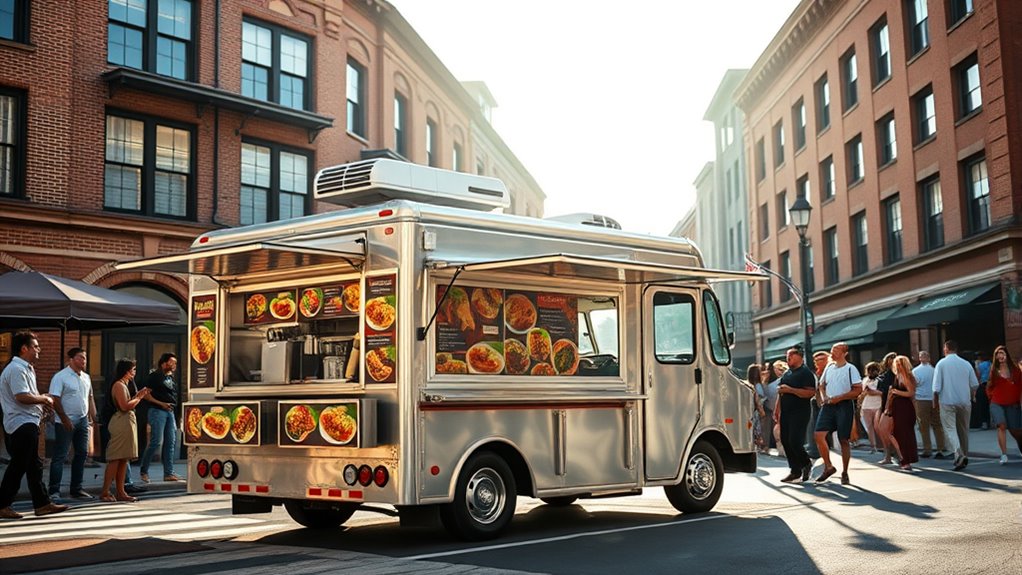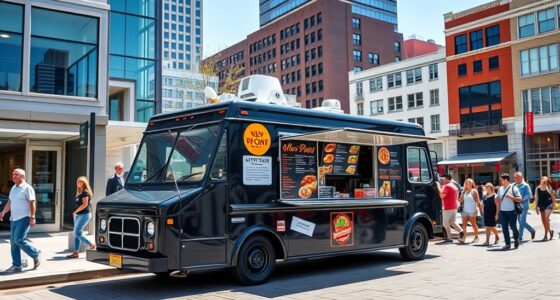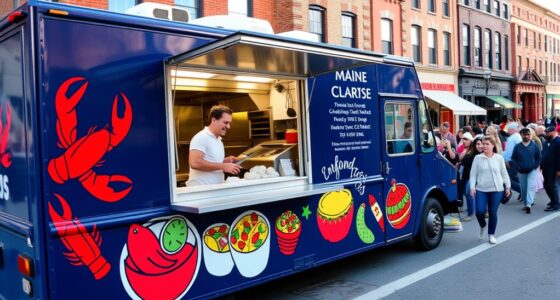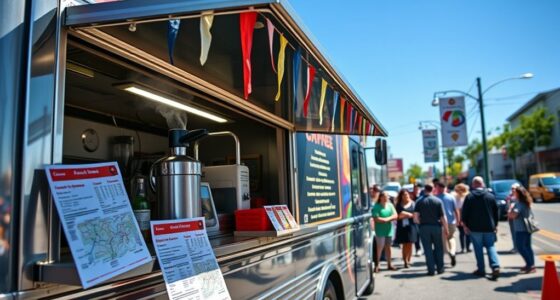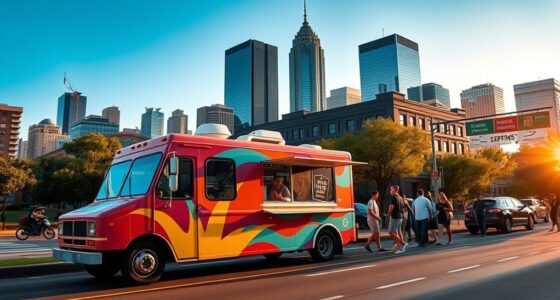To open a food truck in Detroit, you’ll need permits like a Food Service License, Mobile Food License, and possibly a Special Transitory Food Unit license, along with a Sales Tax Permit. Budget around $30,000 to $70,000 for a used truck and additional costs for equipment, permits, and insurance. Choose high-traffic, permitted locations and craft a menu featuring Detroit favorites like Coney Dogs and pizza. Effective marketing and community engagement will boost your success—learn more by continuing further.
Key Takeaways
- Obtain required permits such as a Michigan Food Service License, Mobile Food Establishment License, and local zoning and health permits before operating.
- Budget for vehicle costs ($30,000–$70,000 used, up to $175,000 new), equipment, permits, and monthly operating expenses ($5,000–$10,000).
- Focus on high foot traffic, permitted locations, and secure property owner permissions to maximize visibility and compliance.
- Develop a community-centric menu featuring Detroit staples like Coney Dogs and multicultural influences, rotating seasonal and trending items.
- Use social media, participate in local events, and implement loyalty programs to boost visibility, customer engagement, and repeat sales.
Navigating Permits and Licenses for Your Detroit Food Truck
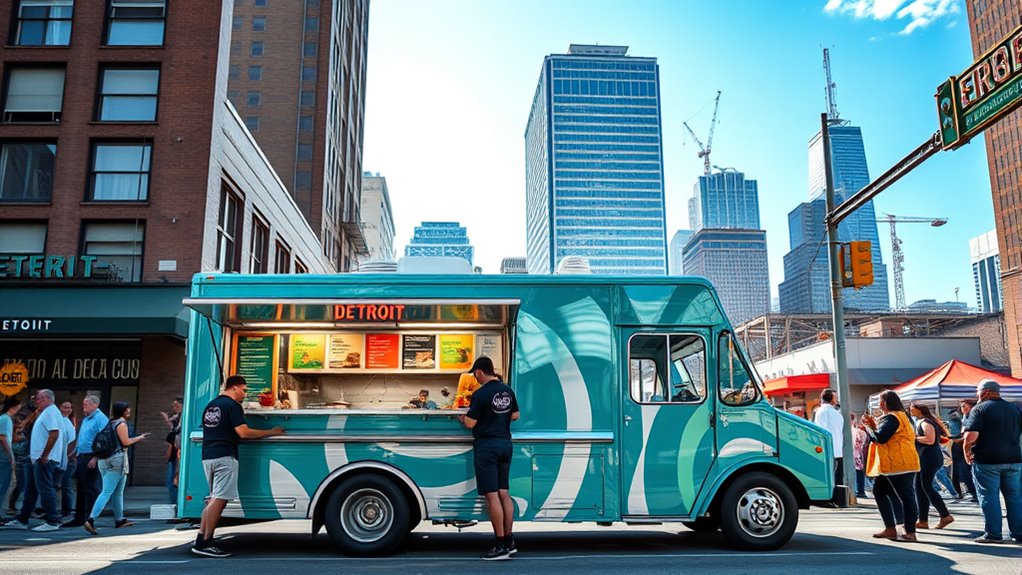
Getting your Detroit food truck on the road requires steering a variety of permits and licenses. First, you need a Food Service License, issued by the Michigan Department of Agriculture & Rural Development or your local health department, which must be renewed annually by April 30. If your truck returns to a commissary every 24 hours, you’ll also need a Mobile Food Establishment License, costing around $192. Supporting your truck with a commissary requires a Mobile Food Establishment Commissary License, also about $192. For temporary or event-based vending, obtain a Special Transitory Food Unit (STFU) License. Additionally, a Sales Tax Permit from the Michigan Department of Treasury is necessary to collect sales tax legally. These licenses must be obtained before operation begins. Make sure to submit applications early, prepare for inspections, and keep records for renewal and compliance. Ensuring compliance with local health regulations is also essential to avoid penalties and ensure safety.
Understanding Costs and Budgeting for Your Mobile Business
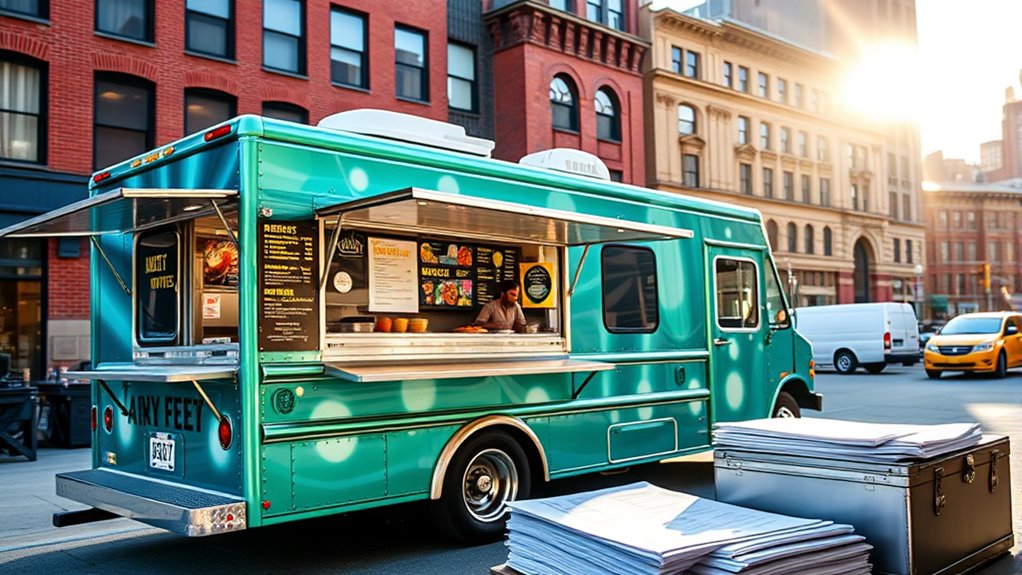
To start your food truck journey, you need to understand the costs involved in launching and running your business. From licensing expenses to equipment and supplies, each factor impacts your budget substantially. Knowing these costs helps you plan effectively and keep your mobile venture profitable. Accurately estimating startup costs is essential to avoid unexpected expenses and ensure your business remains financially viable. Additionally, understanding the importance of cost management strategies can help optimize your budget and improve profitability.
Licensing Expenses Overview
Understanding licensing expenses is essential for budgeting your food truck business effectively in Detroit. Licensing costs vary based on your truck type and operations, with fees ranging from $73 for temporary permits to over $192 annually for a Mobile Food Establishment license. Additional costs include plan review fees, inspection charges, and permits for special events or parking. You’ll also need to budget for food manager certifications and liability insurance, which can cost thousands annually. Keep in mind that licenses expire yearly and require renewal to avoid late fees. Planning for these expenses upfront ensures smooth compliance and avoids unexpected costs. The color accuracy of your permits and licenses can also influence the overall success of your mobile business.
Equipment and Supplies Cost
Budgeting for equipment and supplies is essential to launching and running a successful food truck in Detroit. Your startup costs will vary based on truck choice and outfitting. Here are key expenses to consider:
- Vehicle costs: New trucks range from $50,000 to $175,000, while used trucks cost $30,000 to $70,000. Customization adds $15,000 to $20,000. Selecting the right vehicle size is crucial for operational efficiency and city regulations.
- Cooking equipment: Essential items like grills and fryers can cost between $900 and $1,300 each, with ovens ranging up to $10,000. Fire suppression systems add $2,000 to $5,000.
- Refrigeration and storage: Units cost $1,000 to $5,000, and prep tables with refrigeration run $1,500 to $5,000, ensuring food safety and efficiency.
Operating and Permitting Fees
Understanding the permitting process in Detroit can seem complex, but knowing the associated costs helps you plan more effectively. Food truck permits, including health permits, range from a few hundred to several thousand dollars, depending on permit type and validity. You’ll also need city-specific permits for parking and location, which come with additional fees. Insurance costs are higher here, with minimum coverage around $2 million, impacting your premiums. Business licenses and vending permits can total between $1,800 and $28,000 annually. Don’t forget about renewal and inspection fees, as lapses may incur penalties. Operating costs like fuel, labor, maintenance, and supplies add to your budget—monthly expenses typically range from $5,000 to $10,000. Managing compliance requirements is essential to avoid unexpected expenses and ensure continuous operation. Industry trends in 2025 indicate Planning for these fees ensures your food truck runs smoothly and legally in Detroit.
Selecting Prime Locations and Ensuring Regulatory Compliance
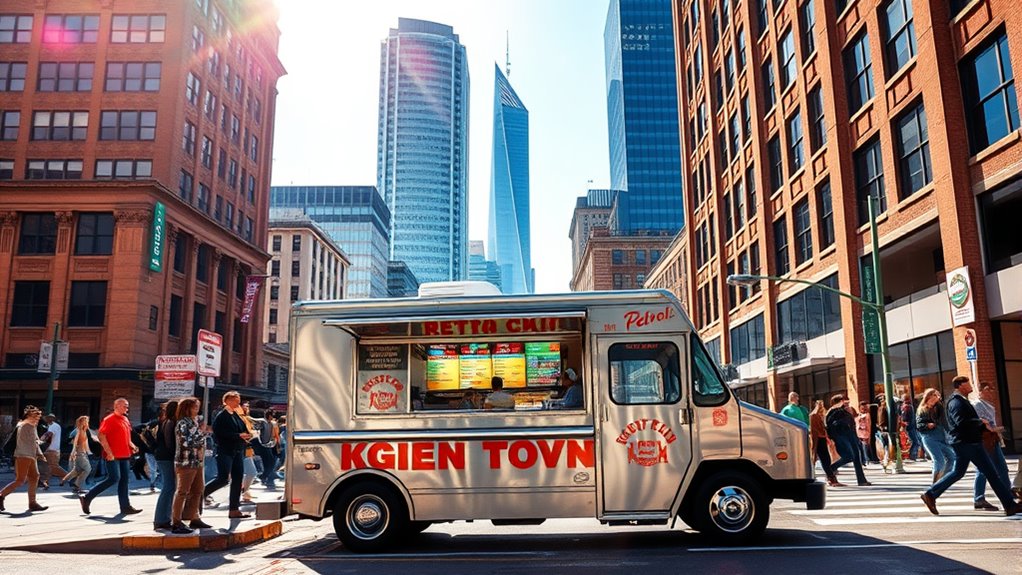
Choosing the right location is essential for your food truck’s success in Detroit, but it requires careful attention to city regulations and strategic site selection. First, guarantee you operate only in city-designated zones, avoiding residential streets. Second, prioritize high foot traffic areas like parks, commercial districts, or light industrial zones with available parking and access. Third, verify proximity to a licensed commissary, as trucks must return daily for food prep and storage. Additionally, you need permits, including a mobile food establishment license, and must pass fire and health inspections. Always get written permission from property owners for private land vending, and adhere to regulations about noise, waste disposal, and signage. Detroit has specific regulations that restrict food trucks from parking in certain areas to reduce congestion and preserve local businesses, and staying compliant and selecting ideal sites are key to building a successful food truck business in Detroit. It’s also beneficial to stay informed about local regulations and restrictions on food truck operation, which can change and impact your business plans.
Crafting a Menu That Resonates With Detroit Customers
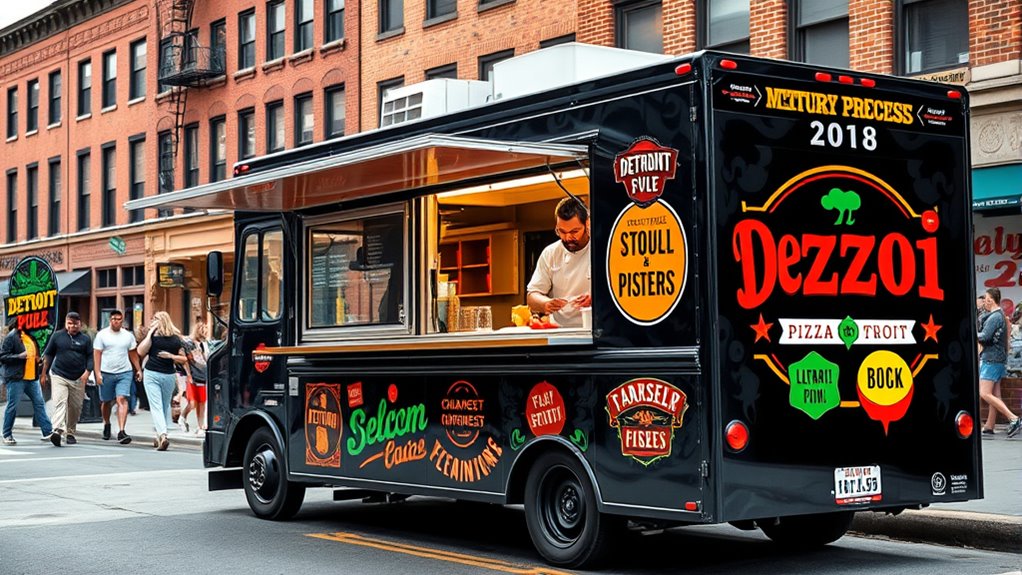
To connect with Detroit customers, your menu should highlight local flavors and cultural influences that resonate with the community. Incorporating seasonal ingredients keeps offerings fresh and trendy, appealing to diners seeking innovative yet familiar dishes. By blending tradition with modern twists, you create a menu that’s both authentic and exciting, encouraging repeat visits. Additionally, featuring popular local vendors and seasonal specials can boost your truck’s visibility and appeal. Downtown Street Eats has demonstrated how showcasing beloved local foods can attract a loyal customer base. Emphasizing local ingredients and authentic preparation methods can further deepen community engagement and authenticity.
Local Flavor Inspiration
Creating a menu that truly resonates with Detroit customers means embracing the city’s rich culinary heritage and diverse cultural influences. To do this effectively, incorporate iconic dishes and flavors that reflect Detroit’s unique identity. For example, highlighting Detroit staples like the Coney Dog, with its savory chili and mustard topping, and Detroit-style Pizza, featuring its thick, square crust and caramelized edges, can create a strong local appeal. Incorporating multicultural influences such as Polish Paczki or Vietnamese Pho, paying homage to Detroit’s immigrant communities, adds depth and authenticity to your offerings. Use local ingredients and flavors, like Zip Sauce or Faygo soda, to create authentic pairing options that celebrate Detroit’s flavors. Understanding the city’s diverse culinary traditions can help you craft a menu that truly captures the spirit of Detroit. Additionally, exploring regional food preferences ensures your menu aligns with what local customers crave.
Seasonal and Trendy Options
Tailoring your menu to match the changing seasons and current food trends can considerably boost your food truck’s appeal in Detroit. In warmer months, focus on lighter, fresh options like salads, wraps, and cold beverages, while cooler months call for heartier comfort foods and warm sides. Rotate seasonal ingredients from Michigan’s harvest to keep offerings fresh and local, appealing to customers’ desire for hyper-local produce. Capitalize on special event days, such as the Detroit Grand Prix, with limited-time, festival-inspired dishes. Incorporate trendy beverages like mocktails and specialty lemonades for summer. Embracing plant-based dishes, fusion cuisines, and innovative comfort foods also aligns with Detroit’s diverse palate. Stay flexible and adapt your menu based on local events and evolving food trends to keep customers excited year-round. Additionally, incorporating popular local vendors and flavors, such as those featured at the Detroit Grand Prix, can further enhance your menu’s appeal and connection to the community.
Marketing Strategies to Launch and Grow Your Food Truck Brand
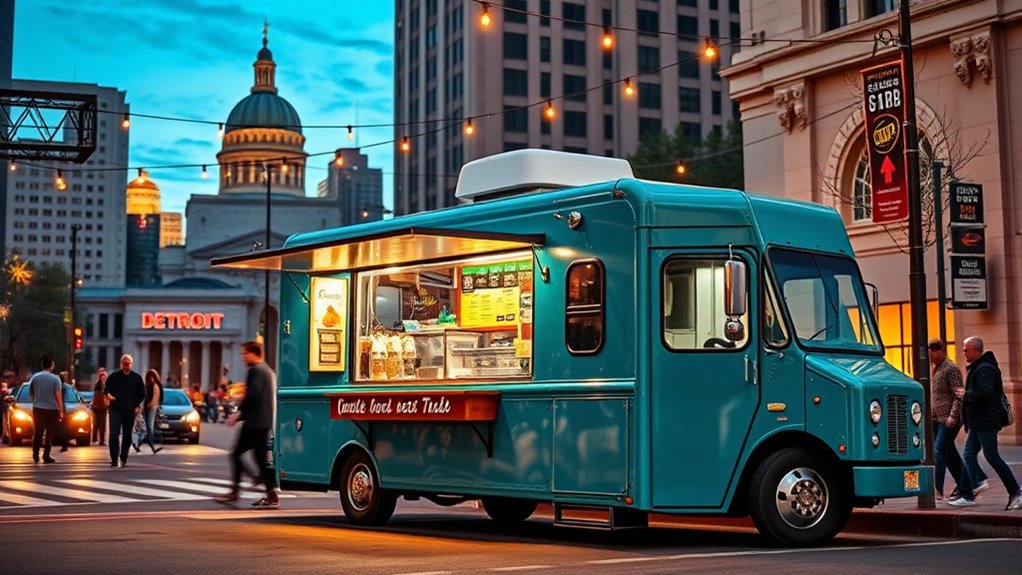
Launching and growing a successful food truck brand requires strategic marketing efforts that effectively reach your target audience and build brand loyalty. To do this, focus on these key strategies:
- Leverage social media platforms like Facebook, which 75% of food trucks actively use, to boost engagement and visibility. Regular posts and targeted campaigns can increase sales by 20% on average. Social media marketing is also an effective way to showcase seasonal and holiday-themed promotions, which lead to a 25% rise in customer visits. Incorporating filtration efficiency into your marketing messaging can highlight your commitment to quality ingredients and cleanliness, appealing to health-conscious customers.
- Participate in local events and festivals, with 80% of trucks attending at least three annually, to enhance brand recognition and attract diverse customers. Community involvement fosters word-of-mouth and strengthens local ties. Additionally, over 50% of food trucks have implemented loyalty programs, resulting in a 30% increase in repeat visits.
- Implement customer loyalty programs, such as digital punch cards or exclusive offers, which can increase repeat visits by 30%. Use data analytics to personalize rewards and maximize ROI. Incorporating loyalty apps integrated with POS systems can also contribute to a 20% increase in repeat sales.
These tactics help you build a strong, recognizable brand in Detroit’s competitive food scene.
Tips for Successful Operations and Building a Local Following
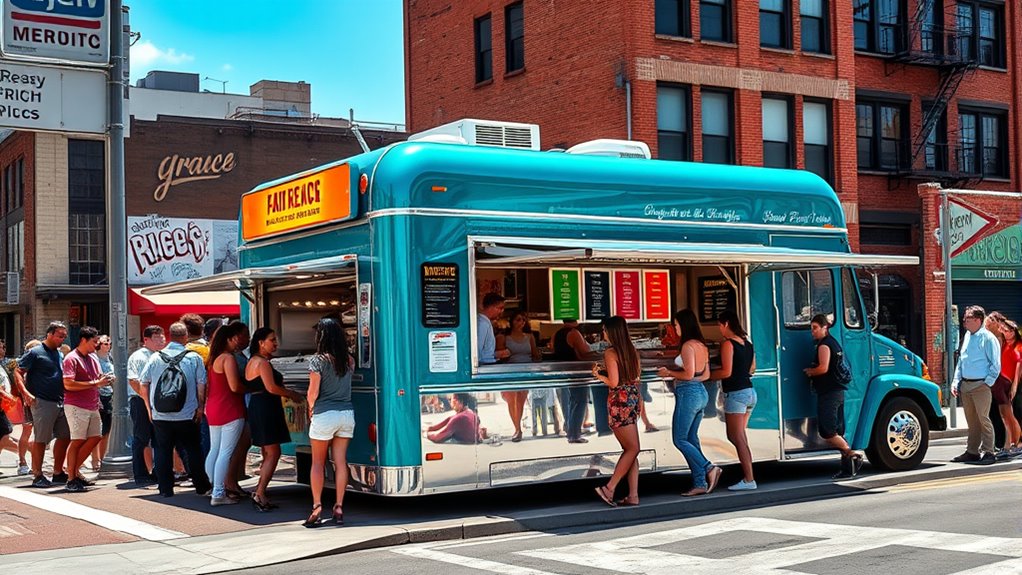
To succeed in Detroit’s competitive food truck scene, maintaining food quality and menu consistency is essential. Operate from approved commissaries that meet health department standards to guarantee food safety. Include at least one healthy option to meet city regulations and appeal to health-conscious customers. Balance popular items with nutritious choices to attract a broader audience. Consistent preparation and presentation build trust with repeat customers, fostering loyalty. Incorporate seasonal menus to adapt to Detroit’s harsh winters and changing tastes. Focus on selecting high-traffic, permitted locations that maximize exposure without violating regulations. Collaborate with local businesses and participate in community events to boost visibility. Providing friendly, efficient service and actively engaging with your customers will help build a strong local following and ensure your truck’s long-term success.
Frequently Asked Questions
How Long Does the Entire Licensing Process Typically Take in Detroit?
The licensing process in Detroit typically takes about 15 to 45 business days, depending on the permit type and completeness of your application. You should plan for at least 30 days for standard permits, with additional time for health reviews or special event permits. To avoid delays, submit all documentation early, complete necessary inspections, and consider completing a licensing course to streamline your application process.
Are There Specific Detroit Neighborhoods More Favorable for Food Truck Operations?
Think of Detroit’s neighborhoods as a sprawling canvas, each offering unique hues for your food truck venture. Downtown and Midtown are prime spots, bustling with foot traffic in designated zones. Southwest and West Detroit, rich with community spirit, welcome culturally relevant offerings. Health-conscious areas favor nutritious menus, while emerging neighborhoods blossom with new opportunities. Your success depends on selecting the right neighborhood, aligning with local rules, and serving communities enthusiastic for your flavorful touch.
What Are Common Challenges Faced When Starting a Food Truck in Detroit?
When you start a food truck in Detroit, you’ll face several challenges. You need to navigate strict regulations, limit your locations to private property, and deal with seasonal sales drops. Competition is fierce with around 80 trucks vying for attention, and high operational costs cut into your profits. Finding high-traffic spots is tough, especially with reduced foot traffic and limited dedicated food truck hubs in the city.
How Can I Finance My Food Truck Startup in Michigan?
To finance your food truck startup in Michigan, you need to explore multiple options: traditional loans from the Michigan Good Food Fund or local lenders, specialized loans like FoodTruckLender.com, or online lenders offering quick, flexible funding. You can also consider grants, crowdfunding, or community investor networks. Prepare your financial documents, gather vendor quotes, and assess your total funding needs. By exploring diverse sources, you increase your chances of securing the capital to start strong.
What Local Detroit Events Are Ideal for Food Truck Participation?
You should consider Detroit’s major events like the Chevrolet Detroit Grand Prix, where diverse food options attract large crowds, and the Detroit Foodie Fair, which highlights unique and vegan cuisines. The Eastern Market Holiday Food Truck Rally and Pine Knob Food Truck Rally also draw regional audiences with entertainment and social vibes. Participating in these events boosts your visibility, helps build a loyal customer base, and aligns with current food trends.
Conclusion
Starting your Detroit food truck journey might feel like stepping into the Wild West, but with the right permits, location, and marketing plan, you’ll be lapping up success in no time. Keep your menu fresh, your permits in check, and your social media buzzing—think of it as your modern-day saloon. Stick to these tips, and you’ll be serving up delicious eats and building a loyal local following faster than you can say “hot off the griddle.”
